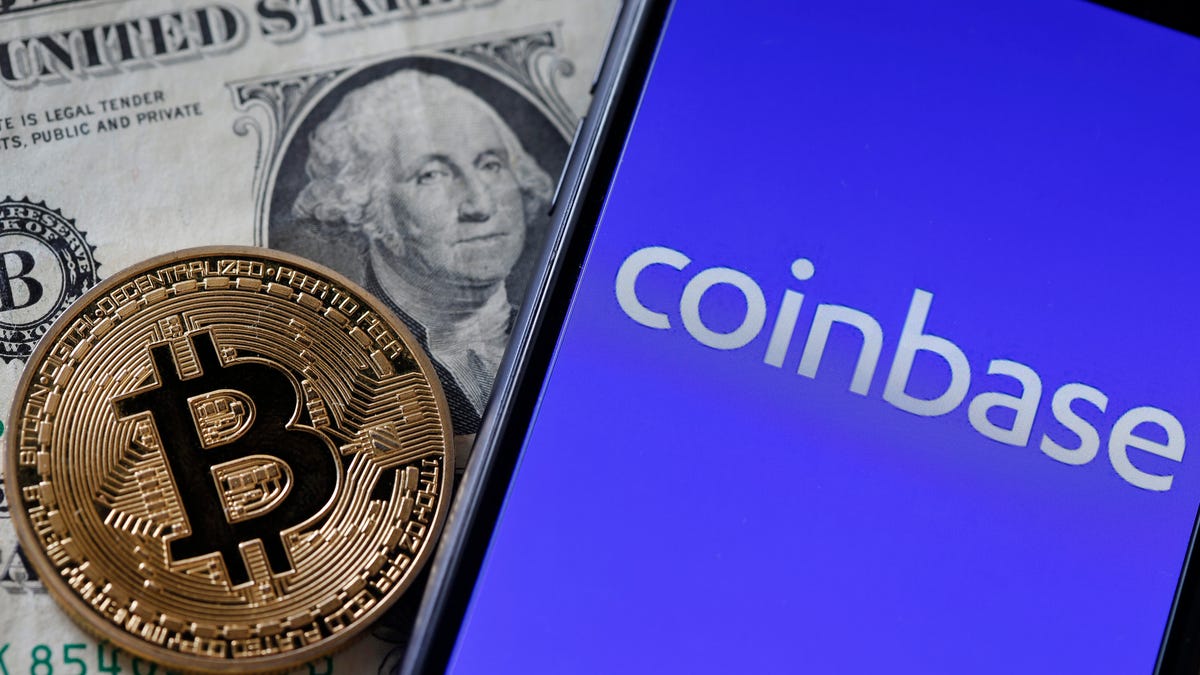Coinbase stock: What you should know about the crypto exchange that just went public
Shares shot up at first, only to slowly make their way down.

It's an interesting time for Coinbase.
Coinbase, one of the largest and most popular cryptocurrency exchanges in the world, went public Wednesday, selling its shares for the first time on the Nasdaq exchange. The company's stock price flew up past its $250 reference price to a high of $429 but then made its way down to close at $328.28, making Coinbase's valuation $85.8 billion.
The frenzy over Coinbase's stock for the day is fueled by the surge of cryptocurrency value, with Bitcoin leading the way, surpassing $63,000 on Tuesday and reaching a record high. There's also the "Coinbase effect," whereby a crypto coin surges in value days after it's listed on the exchange. By going public, Coinbase helps establish the legitimacy of Bitcoin and the cryptocurrencies industry.
Here's everything you need to know about Coinbase going public.
Read also: NFTs explained: These expensive tokens are as weird as you think they are
What is Coinbase?
Founded in 2012 by Brian Armstrong, a former Airbnb engineer, and Fred Ehrsman, a former trader at Goldman Sachs, Coinbase is a popular cryptocurrency exchange known for its intuitive, beginner-friendly interface. It provides an array of tools to help investors learn about different types of crypto -- and rewards them with cryptocurrency for viewing educational tutorials.
More than 53 million users have Coinbase accounts, and use them to trade more than 50 cryptocurrencies including Bitcoin, Ethereum and Litecoin. Coinbase also offers a credit card to customers who want to make purchases with crypto, and a digital wallet to store crypto assets including NFTs.
When can I buy Coinbase stock?
Coinbase went public at 1:25 p.m. ET on the Nasdaq exchange. It initially had a reference price of $250 a share under the COIN ticker symbol, putting the company's valuation at approximately $65 billion, according to The Wall Street Journal. The Nasdaq provided the reference price based on past performance metrics, but when trading of the stock started, it quickly shot up to $429 a share. Share prices have since come down, ending the day at $328.28, increasing the company's valuation to $85.8 billion.
Why is Coinbase using a direct listing?
In keeping with the subversive foundation of cryptocurrency, Coinbase's decision to eschew an IPO isn't altogether surprising. With an IPO, a company partners with financial institutions to promote its stock with the hope of selling shares to raise capital. A direct listing, in contrast, provides a venue for existing stakeholders in the company -- who already own stock -- to sell shares to the public. Coinbase stockholders will be looking to sell almost 115 million shares.
A direct listing, with shares trading in the open market without banks underwriting the offering, is generally considered a less expensive but riskier option for a company. Spotify chose to go with a direct listing when it went public in 2018, as did Slack in 2019.
Have there been any controversies at Coinbase?
Some crypto traders aren't so hot on Coinbase's practices. That's mainly because of its fee for trading and buying crypto. Coinbase charges a 0.5% fee, while other exchanges charge from 0.05% to 0.1%. The other issue for some traders is the relatively small number of cryptocurrencies available to trade on Coinbase. There are more than 5,000 altcoins, a term referring to a cryptocurrency that's not Bitcoin, and Coinbase trades just over 50 of those. One of the more popular altcoins not available for trade on the exchange is Dogecoin.
Back in 2018, Coinbase users found they were being charged on their Visa cards multiple times for transactions with the exchange. It turns out the credit card issuer had recently changed how cryptocurrency transactions were processed, which led to multiple charges. Transactions were reversed for the people affected.
This past October, 5% of Coinbase's employees left the company after CEO Brian Armstrong wrote a blog post calling for an apolitical workplace. Armstrong wrote a follow-up post to clarify his intentions.
What is the 'Coinbase effect'?
Because Coinbase trades a limited number of cryptocurrencies, it's developed a reputation as a kingmaker. The "Coinbase effect" refers to the sharp jump in a cryptocurrency's value once it's listed on the exchange. On average, prices for a newly listed coin can go up by 91% within five days.

